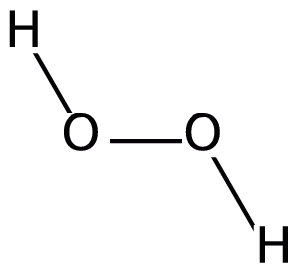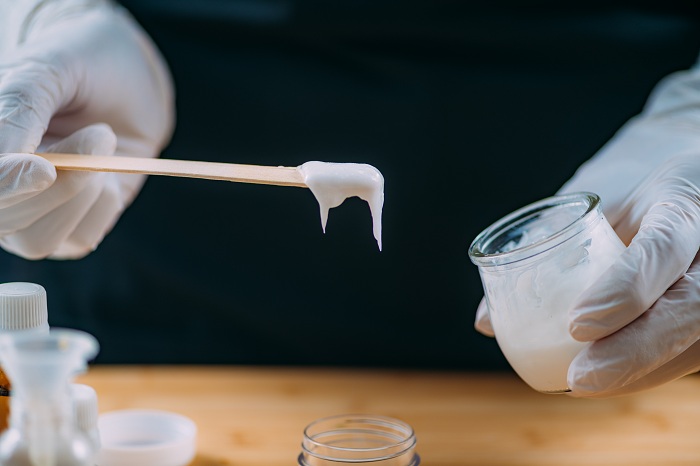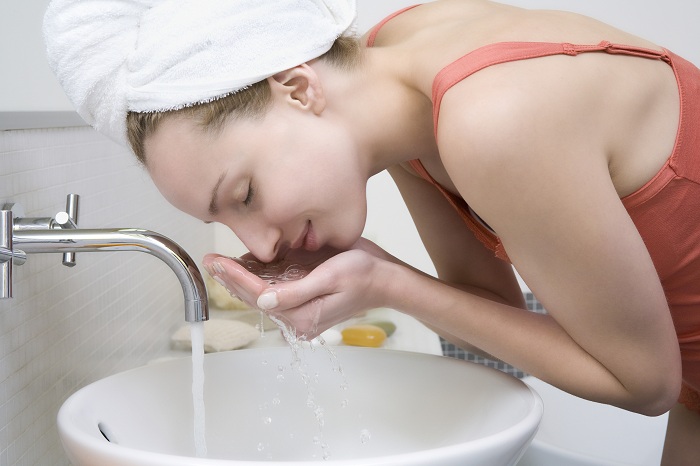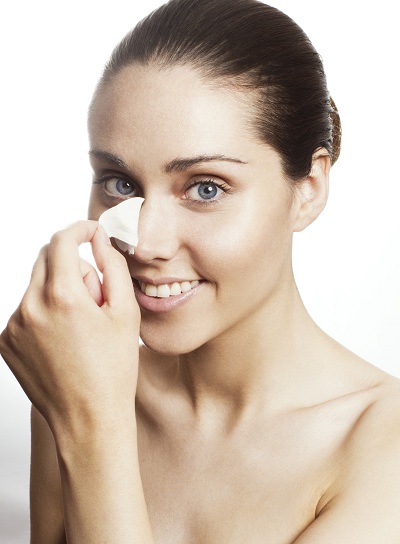Whether you’re dealing with acne marks on your t-zone, dark spots on your cheeks, or hyperpigmentation on your body, chances are that you’re looking for a way to bleach those dark marks as quickly as possible so that you can enjoy an even skin tone once again.
If this is the case, then it only makes sense that hydrogen peroxide would come up in your research. After all, this chemical is commonly used to bleach hair and textiles, so surely it would have the same effect on your skin too?
Turns out, it all depends on how you use it. Hydrogen peroxide is a powerful acid – use it incorrectly and you may end up damaging your skin. However, learn how to use it in a safe manner and you could experience some fantastic benefits.
Contents
- What Does Peroxide Do to Your Skin?
- Can Household Bleach Lighten Skin & Fade Hyperpigmentation?
- How to Bleach Skin With Peroxide: 6 Uses & Homemade Recipe Ideas for Your Face & Body
- How to Make Bleaching Cream Using Hydrogen Peroxide
- Cleaning Your Skin With a Hydrogen Peroxide Face Wash
- This Recipe for Blackheads, Pimples, and Acne Scars Offers Great Before and After Results
- Hydrogen Peroxide and Baking Soda are Great for Dark Buttocks & the Inner Thighs
- A DIY Hydrogen Peroxide Face Pack With Great Reviews
- Soaking in Hydrogen Peroxide: How Much Hydrogen Peroxide to Put in Bath Water?
- Can Peroxide Burn Your Skin? The Side Effects to Be Aware Of
- FAQ:
- Conclusion: Is it Worth Using Hydrogen Peroxide to Lighten Your Skin?
What Does Peroxide Do to Your Skin?

When it comes to skin lightening, there’s no denying that hydrogen peroxide works.
However, the concentration of hydrogen peroxide that you use is extremely important.
Back in the day, research suggested that a 20-30% concentration was needed to bleach the skin [1], but applying such a potent dose of hydrogen peroxide would mean that you’re more than likely to end up dealing with side effects too (more on those later!).
Fortunately, newer studies have countered this, proving that even a 1% concentration of hydrogen peroxide is able to have an effect on skin tone [2].
That’s not all that it does either – hydrogen peroxide has also been found to be an effective acne treatment. Not only can it be even more effective than benzoyl peroxide, a popular acne fighter, but it also comes with fewer side effects when used correctly.
Can Household Bleach Lighten Skin & Fade Hyperpigmentation?
Household bleach is a little different from hydrogen peroxide. It’s often referred to as chlorine bleach, but the two are commonly used interchangeably.
However, while household bleach may be capable of lightening the skin, it’s best to stick to hydrogen peroxide for this purpose. Household bleach tends to be more potent, meaning that you’re more likely to damage your skin cells rather than lightening them.
RELATED: Best Skin Lightening Cream for Melasma
How to Bleach Skin With Peroxide: 6 Uses & Homemade Recipe Ideas for Your Face & Body
Want to know how to use hydrogen peroxide to lighten your skin in a safe and effective manner? Here are 6 ways to get started:
How to Make Bleaching Cream Using Hydrogen Peroxide

Making your own bleaching cream with hydrogen peroxide is a relatively simple process. All you need to do is mix together the following ingredients before adding in enough water to create a pasty, creamy consistency:
- 2 teaspoons of hydrogen peroxide
- 1 tablespoon of milk or yogurt
- 2.5 tablespoons of flour
- Water
Apply this cream to the areas of skin that you want to lighten. Unlike regular creams, this one shouldn’t be allowed to remain on the face for longer than 15 minutes or the hydrogen peroxide could cause damage.
So, make sure that you rinse it off with warm water once you’re done, and then pat your skin dry.
Cleaning Your Skin With a Hydrogen Peroxide Face Wash
Using hydrogen peroxide in the cleansing stage of your skincare routine is a great way to rid your skin of the bacteria that could otherwise lead to acne breakouts, while also giving your skin a dose of skin bleaching agents.
Start by cleansing your face with your usual cleanser – this removes impurities that would otherwise block the hydrogen peroxide from penetrating your pores.
Then, use a cotton pad to apply a 3% hydrogen peroxide solution to areas of concern. Wait for 5 minutes before rinsing off and following up with a moisturizer.

This Recipe for Blackheads, Pimples, and Acne Scars Offers Great Before and After Results
Want to try using hydrogen peroxide to finally put a stop to your breakouts?
Try mixing 3 teaspoons of it with 3 crushed aspirin tablets. Aspirin contains salicylic acid, an ingredient commonly used in anti-acne products. When combined with hydrogen peroxide, the two are very effective.
Simply apply your mixture to your skin with a cotton pad and then rinse off after 5 minutes.
Hydrogen Peroxide and Baking Soda are Great for Dark Buttocks & the Inner Thighs
Thanks to its natural bleaching properties, baking soda is another popular DIY ingredient used to lighten the skin. Maximize its effects by mixing it with hydrogen peroxide.
You’ll need 1 tablespoon of each ingredient. Combine them together and then apply the paste to your face, rinsing it off after 5 minutes.
RELATED: How to Lighten Skin Fast With Baking Soda
A DIY Hydrogen Peroxide Face Pack With Great Reviews
Homemade face masks can be very effective at lightening hyperpigmentation, and this recipe, which features hydrogen peroxide, is no exception.
Mix 1 teaspoon of hydrogen peroxide with 1 teaspoon of aloe vera gel. This is another great natural ingredient for skin lightening, and it also offers up several other skin-boosting benefits too.
Apply the mixture to your face and leave it on for 5-10 minutes, before rinsing off.
Soaking in Hydrogen Peroxide: How Much Hydrogen Peroxide to Put in Bath Water?

If you’d like your entire body to benefit from the bleaching properties of hydrogen peroxide, try adding the ingredient to your next bath.
You’ll need between 0.5-1 cup of hydrogen peroxide. You could also add in some Epsom salts too for an intensified skin detox.
Then, soak in the bath for no more than 30 minutes.
Can Peroxide Burn Your Skin? The Side Effects to Be Aware Of
Hydrogen peroxide is a very strong chemical, so yes, it can cause a number of side effects if you use too much of it, or use it too often.
The higher the concentration of hydrogen peroxide you use, the more likely you are to experience one or more of the following adverse reactions:
- Redness
- Skin burns
- Blisters and swelling
It goes without saying that accidentally inhaling or ingesting hydrogen peroxide can cause even more serious issues.
To avoid those side effects, make sure that you’re using the ingredient at a safe concentration – never apply anything with more than 3% hydrogen peroxide to your skin.
Make sure that you keep all of your DIY hydrogen peroxide treatments away from your eye area too – the ingredient can cause permanent damage to your eyes.
You should also limit how often you use hydrogen peroxide treatments. Stick to 2-4 treatments in total – if you go over this, you’ll likely end up doing more harm than good to your skin.
FAQ:
Q: How do I use hydrogen peroxide to whiten my skin?

Hydrogen peroxide should always be diluted with other ingredients, whether this may be water, milk, aloe vera, or something else. Then, apply it to your skin for 5-10 minutes before rinsing off.
Q: Is hydrogen peroxide good for your skin?
While not technically good for your skin, hydrogen peroxide can be helpful in treating hyperpigmentation and acne.
Q: Can I leave hydrogen peroxide on my skin overnight?
No, hydrogen peroxide shouldn’t be left on the skin overnight.
Q: How to get rid of white skin from hydrogen peroxide?
If you end up with white patches on your skin after using hydrogen peroxide, these are basically chemical burns and will need to be treated as such.
Q: How long does it take for hydrogen peroxide to lighten dark spots?
Hydrogen peroxide takes a few weeks to lighten dark spots.
Q: Does hydrogen peroxide dry out the skin?
Yes, hydrogen peroxide dries up the sebum on your skin, which can then leave your skin feeling dry.
Conclusion: Is it Worth Using Hydrogen Peroxide to Lighten Your Skin?
While hydrogen peroxide may be able to successfully lighten your skin, you can’t ignore its potential side effects either. There are plenty of safer alternatives out there that should always be tried first.
However, if these don’t work for you, then it could be worth giving hydrogen peroxide a go, so long as you ensure that you always use it at a safe concentration.
References
[1] https://onlinelibrary.wiley.com/doi/pdf/10.1002/3527600418.mb772284e0026
[2] https://pubmed.ncbi.nlm.nih.gov/31103570/